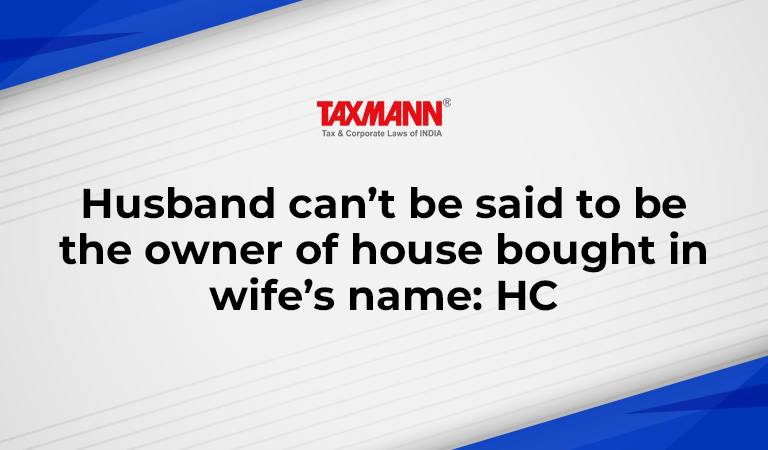Husband can’t be said to be the owner of house bought in wife’s name: HC
- Blog|News|Income Tax|
- 2 Min Read
- By Taxmann
- |
- Last Updated on 31 May, 2022

Case Details: Antony Parakal Kurian v. ACIT - [2022] 138 taxmann.com 440 (Karnataka)
Judiciary and Counsel Details
-
- Mrs S. Sujatha & S. Rachaiah, JJ.
- Sudheendra B.R., Adv. for the Appellant.
- K.V. Aravind, Adv. for the Respondent.
Facts of the Case
During the relevant year, the assessee sold land and claimed long-term capital gain exemption under section 54F by making an investment in residential house. The assessee claimed that on the date of sale of such land, he was the owner of only one residential house.
However, Assessing Officer (AO) noticed that prior to date of sale of such land, the assessee had purchased a residential house in name of his wife. On said purchase of the residential house, the assessee also claimed the benefit of Section 54 exemption. Thus, he denied the exemption under section 54F on grounds that the assessee was holding two residential houses on the date of sale of land.
Lower authorities upheld the order of AO. Aggrieved-assessee filed the instant appeal before the Karnataka High Court.
High Court Held
The Karnataka High Court held that the phrase ‘owns’ used by the proviso (a)(i) to section 54F(1) plays a significant role. What is relevant is the assessee should not own more than one residential house, other than the new asset, on the date of transfer of the original asset.
Section 54F encourages investment in a residential house. For qualifying for the exemption under section 54F, what is mandatory is the investment to be made in a residential house in the name of the assessee only. Section 54F shouldn’t be construed liberally to give wide and liberal interpretation to the word ‘assessee’ so as to include the assessee’s legal heirs as well.
In the instant case, the second residential house property was standing in the name of the assessee’s wife as per the registered sale deed. For all practical purposes, and even as per section 14 of the Hindu Succession Act, 1956, the property standing in the name of a female heir becomes her absolute property.
Even if the assessee had claimed section 54 exemption by purchasing a house in the name of his wife but while considering the exemption under section 54F, such house cannot be construed as the property owned by the assessee.
Accordingly, residential house purchased in wife’s name cannot be considered as property owned by the assessee, thus, it cannot be construed as owned by the assessee for determining eligibility for exemption under section 54F.
List of Cases Reviewed
-
- DIT, International Taxation v. Mrs. Jennifer Bhide [2011] 15 taxmann.com 82/203 Taxman 208/[2012] 349 ITR 80 (Kar.) (para 16) followed.
List of Cases Referred to
-
- CIT v. M.J. Siwani [2014] 46 taxmann.com 170/226 Taxman 394/366 ITR 356 (Kar.) (para 9)
- DIT, International Taxation v. Mrs. Jennifer Bhide [2011] 15 taxmann.com 82/203 Taxman 208/[2012] 349 ITR 80 (Kar.) (para 16).
Disclaimer: The content/information published on the website is only for general information of the user and shall not be construed as legal advice. While the Taxmann has exercised reasonable efforts to ensure the veracity of information/content published, Taxmann shall be under no liability in any manner whatsoever for incorrect information, if any.

Taxmann Publications has a dedicated in-house Research & Editorial Team. This team consists of a team of Chartered Accountants, Company Secretaries, and Lawyers. This team works under the guidance and supervision of editor-in-chief Mr Rakesh Bhargava.
The Research and Editorial Team is responsible for developing reliable and accurate content for the readers. The team follows the six-sigma approach to achieve the benchmark of zero error in its publications and research platforms. The team ensures that the following publication guidelines are thoroughly followed while developing the content:
- The statutory material is obtained only from the authorized and reliable sources
- All the latest developments in the judicial and legislative fields are covered
- Prepare the analytical write-ups on current, controversial, and important issues to help the readers to understand the concept and its implications
- Every content published by Taxmann is complete, accurate and lucid
- All evidence-based statements are supported with proper reference to Section, Circular No., Notification No. or citations
- The golden rules of grammar, style and consistency are thoroughly followed
- Font and size that’s easy to read and remain consistent across all imprint and digital publications are applied



 CA | CS | CMA
CA | CS | CMA
